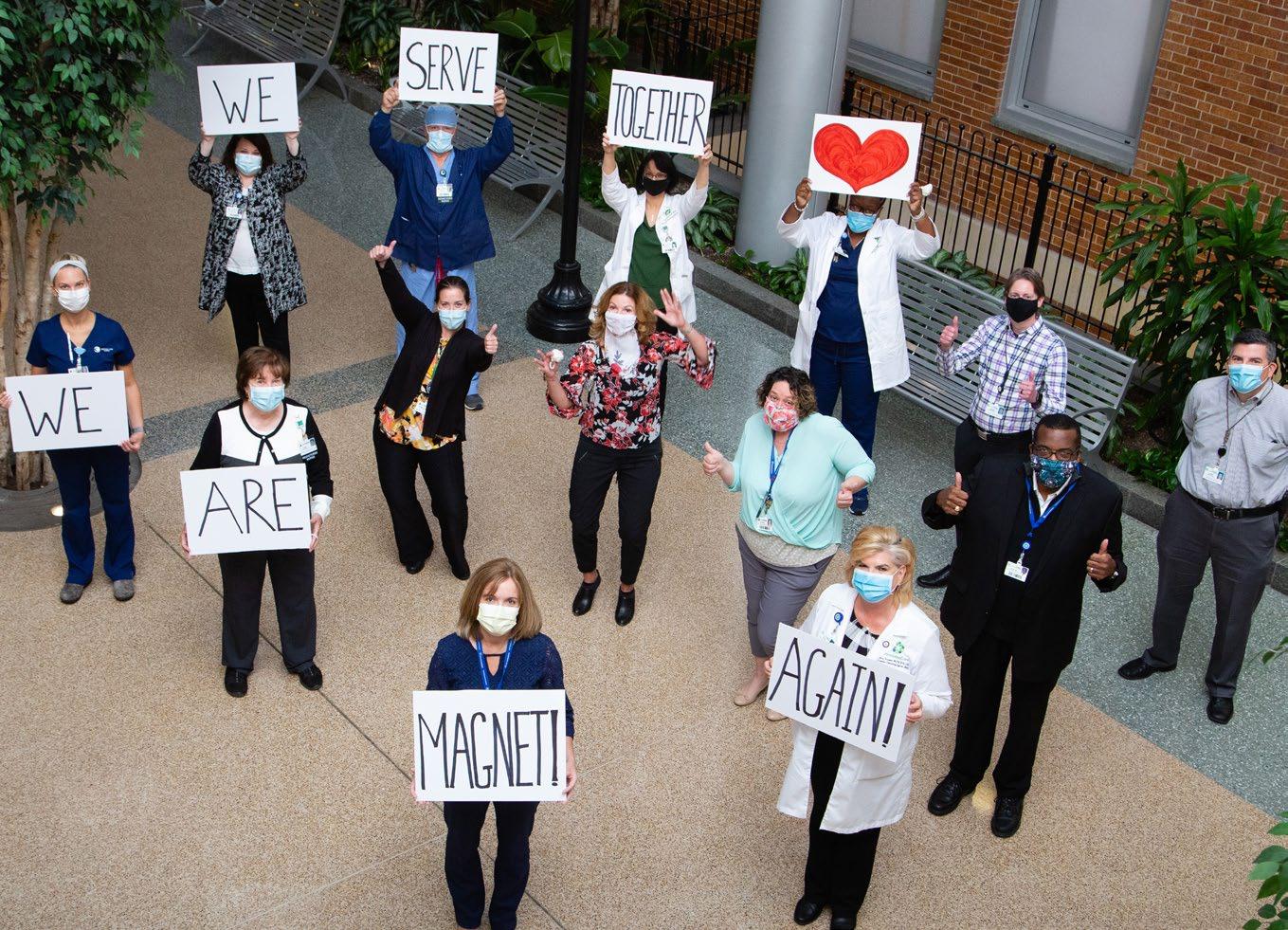
4 minute read
Exemplary Professional Practice
Exemplary Professional Practice within nursing is the essence of a Magnet institution. It stems from a comprehensive understanding of the role of nursing, the application of this role with patients, families, communities and across interdisciplinary teams, and the pursuit and adoption of new knowledge and evidence. Exemplary Professional Practice is about being exceptional today and even better tomorrow.
Preventing cancer readmissions
Can medical record data help lower emergency department (ED) visits and hospital readmissions for some cancer patients? Yes, according to a new study by our Organizational Excellence, Oncology Nursing and Cancer Care Management teams. They’ve joined forces to create a computer model based on variables from patients’ individual medical records to identify at-risk patients prior to discharge. During the 13-month study, caregivers focused interventions on these patients. The 30-day readmission rate saw a steady decline for patients classified as high-risk (by 16%) as well as for the total population (by 10%). And in the pilot phase for the total population, the average length of stay decreased to 5.9 days and the number of ED visits dropped by 3%.
Special delivery
Nursing caregivers were front and center in the 2020 opening of ChristianaCare’s new Center for Women’s and Children’s Health. They helped keep the project on track, despite the challenges COVID-19 presented. A stateof-the-art facility, the Center for Women’s and Children’s Health is one of 13 nationwide to offer “couplet care” in the NICU, keeping mother and baby together even if they both require medical care. More than bricks and mortar, the center supports and enhances the most current, evidence-based models of care, with improved integration of services and the space to offer innovative, patient-centered care for mothers, babies and families.
Home Care Coach™ among Amazon’s first HIPAA-eligible skills

ChristianaCare’s vision is that all care that can be digital will be digital, and all care that can be done in the home or in the community will be done in the home or in the community. HomeHealth’s new Home Care Coach™ advances this vision. Designed by HomeHealth caregivers and ChristianaCare’s Health and Technology Innovation Center, the voice assist tool uses Alexa Skills and allows caregivers to customize patients’ care plans. Patients can also ask Alexa questions about their own care and receive personalized answers in return.
Teach-back moves forward
In 2020, thousands of ChristianaCare caregivers received training on Teach-back, an evidence-based approach for improving patient understanding designed and led by nurses. In addition, representatives from ChristianaCare’s Virtual Education and Simulation Training Center trained leaders from Nursing and other disciplines in Teach-back observations. These leaders observe staff and provide feedback to encourage use of and improve Teach-back techniques.
Our Patient and Family Health Education and Patient Experience teams also developed a Teach-back Toolkit to serve as a readily available resource for ongoing training and reinforcement. The two teams continue to collaborate to reach more caregivers and support sustaining and fostering of the Teach-back skill.

Stepping in and stepping up
When COVID-19 hit, our Nursing leadership team developed the Capacity Assistance Program (CAP) to meet coverage needs.
CAP is designed for any type of emergent crisis that threatens to overwhelm day-to-day acute care operations. The program provides guidelines for scheduling an adequate number of nursing caregivers with the competencies needed to provide exceptional care. It redeploys non-bedside clinical nurses to assist with unit needs and patient care as needed. The emergency plan outlines levels of severity response in ensuring adequate nursing care when normal operations are exceeded. In addition, it calls for daily staffing huddles to discuss elevating care delivery needs to the next levels.
CareVio™ COVID-19 monitoring
For eight years, ChristianaCare’s award-winning CareVio care management system has monitored patients at home to help them manage their health all the time, not just when they are at the doctor or the hospital. With its unique technology platform, specially trained caregivers and one-to-one access to care, CareVio became the foundation of the health system’s COVID-19 virtual response.
Using CareVio monitoring, CareVio nurses were able to provide key information like the results of COVID-19 tests, directly to patients. For COVID-19 positive patients, they offered twice daily phone or text check-ins to monitor symptoms and recovery. This essential service helped primary care providers focus on seeing patients rather than fielding calls for test results or other nonurgent care questions.
Annual wellness during crisis
At the beginning of the COVID-19 emergency, ChristianaCare’s primary care caregivers pressed pause on annual wellness visits to identify a safe way to meet the needs of their high-risk patient population—mostly Medicare patients age 65 and older who were anxious about in-person visits. In a just a few weeks, the health system set up a vast telehealth infrastructure for annual wellness visits and other primary care services, outfitting nurses and physicians with laptops and training them in video, phone and portal protocols. By the end of 2020, the primary care community of practice had reached its pre-pandemic target for number of annual wellness visits for the year.









